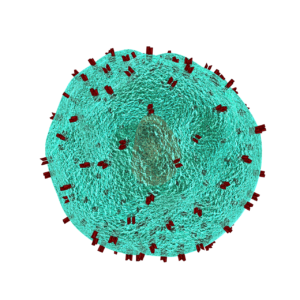A food sensitivity is different than a food allergy which is different from a food intolerance. These terms are mutually exclusive and are not interchangeable!
Food allergies trigger IgE immune reactions, wherein, food sensitivities trigger IgG immune reactions. Food intolerances are caused by an enzyme deficiency. For example, someone may have an anaphylactic allergy to peanuts (food allergy – IgE), have a food sensitivity to eggs (food sensitivity – IgG), and be lactose intolerant (lactase deficiency/food intolerance).
About Food Sensitivities
When you eat food your immune system gets “activated” and one way that this happens is by the creation of IgG antibodies to foods you eat. This is normal and expected. These antibodies attach to foods. When these antibodies attach to foods they create antibody-food “clusters” also called an “immune complex”. Think of the antibody-food immune complex like a lock and key – they are specific, and when they have the right fit they stick together. Again, this is normal and expected. Our immune system has a clean-up crew called “macrophages” which sweep up the cellular garbage, and normally degrade and essentially eat up these immune complexes. This is ALSO normal and expected (1).
When there are more immune complexes than macrophages can deal with the immune complexes are deposited into tissues and cause an inflammatory response (2). This inflammatory response takes longer to develop which is why food sensitivities are called delayed hypersensitivities. Food allergies are called Type 1 Hypersensitivity, which is life threatening. Food sensitivities, however, are not life threatening, but they can cause symptoms and destruction nonetheless.
The Medical Misconception
Medical doctors often only test for food allergy (IgE), and unfortunately often do not recognize food sensitivities (IgG) as a problem, although some physicians are beginning to offer sensitivity testing. Medical doctors and allergists/immunologists often are looking for immune system reactions that cause immediate hypersensitivity (Within 15 minutes) and immediate problems after eating a trigger food, such as hives, throat closing swelling (angioedema), decreased blood pressure and sometimes death. This type of food allergy testing assesses the IgE branch of the immune system. Treatment for this type of allergy is avoidance of offending foods, or triggers (Bee stings in some people) and if in the case of accidental exposure, urgent administration of an epinephrine shot (Epi-pens) or anti-histamines such as Benadryl.
Allergists will agree that IgG antibodies are created in response to foods, but they may not agree that these immune complexes cause inflammation, unfortunately. Additionally, one type of IgG antibody made in the body is thought to be protective against IgE Immediate hypersensitivities, meaning that IgG antibodies help to protect against food allergies. This is thought to be protective against allergies, however this subclass of protective IgG represents only a very small proportion of IgG created. 90% of IgG antibodies are not protective and turn into immune complexes.
Food Sensitivity Testing
Food sensitivity testing analyzes your immune system’s reaction to many common foods, and could be the important tool you’re missing in your health plan. This type of health testing is called IgG Food Sensitivity Testing. There has been some criticism in the media lately about IgG testing, so let’s set the record straight.
“IgG” stands for “Immunoglobulin G”. IgG is a specific type of antibody made by your immune system in response to a trigger (antigen). Critics say that IgG is merely a marker of exposure to an antigen (A food substance), and this is correct, but, what is misunderstood is that upon exposure to an trigger substance an IgG-antibody mediated inflammatory response can be problematic.
The Bottom Line: your body sees food as a “foreign invader”, so your body sends its immune resources to fight the invader, which keeps us safe and healthy. This is your immune system doing its normal job. In moderation an immune reaction to food is normal and necessary, but strong inflammatory reactions to foods are problematic and can cause unpleasant symptoms.
Symptoms associated with IgG food sensitivities are non-specific and may include:
- Bloating
- Acid reflux
- Gas
- Diarrhea
- Constipation
- Headaches or migraines
- Skin conditions ie. Eczema, psoriasis, rashes, roseacea
- Fatigue
- Joint pain
The most common foods I see patients reacting too are eggs, nuts, shellfish, wheat and cow’s dairy.

Dr. Kristin Spark provides IgG food sensitivity testing which involves a finger prick blood test and small blood spot collection. The blood sample is analyzed against 96 food antigens via an ELISA (enzyme linked-immunosorbent assays) test and the results return back within 2 to 3 weeks.
Criticism of IgG Testing
Critics of IgG testing have said that results of the testing cause patients to be too restrictive in their food choices, leaving patients with low compliance and non-adherence to their diet. Some have even recently said that elimination diets can cause malnutrition and failure to thrive in children. Unfortunately this may be the case when your testing is provided by an ill-advised practitioner. Working with a naturopathic doctor is extremely important to create a diet that provides nutritional adequacy, while still encompasses your nutritional needs. For example, removing dairy from the diet of a young child experiencing eczema is unsafe unless you can unsure adequate calcium intake through other food and perhaps dietary supplemental forms.
Research in Support of IgG Food Sensitivities and Testing:
A direct quotation from a systematic review article as follows, “Among modalities used by many conventional and alternative practitioners, immunoglobulin G (IgG)-based testing showed promise, with clinically meaningful results. It has been proven useful as a guide for elimination diets, with clinical impact for a variety of diseases.” (4)
In a randomized controlled trial with IBS patients, elimination of IgG food sensitivity foods (following IgG Food Sensitivity Testing) has been shown to reduce IBS symptoms by 10-26% over a sham diet, with greater benefit in more compliant patients. When patients reintroduced IgG food sensitivities symptoms increased 25% over the sham diet reintroductions. (5)
In a double-blind, cross-over diet study, a sub-population of patients with Crohn’s disease IgG testing revealed that approximately 80% of patients had food sensitivities to processed cheese and yeast. Following a specific diet in this population resulted in reduced stool frequency and lessened abdominal pain, as well as general well being score improvements. (6)
In patients with migraines and IBS, elimination of IgG food sensitivities reduced pain, frequency, and discomfort scores in both conditions. (7)
Experiencing any of the above symptoms? It might be time to speak to a naturopathic doctor about your options, and about food sensitivity testing!
Resources:
1. Gocki J, Bartuzi Z. “Role of immunoglobulin G antibodies in diagnosis of food allergy.” Adv Dermatol Allergol Vol.33 No..4 (2016): 253-56.
2. Janeaway, CA Jr, Traver P, Walport M et al. Immunobiology: The Immune System in Health and Disease. 5th ed. New York: Garland Science, 2001. Print
3. Gocki J, Bartuzi Z. “Role of immunoglobulin G antibodies in diagnosis of food allergy.” Adv Dermatol Allergol Vol.33 No..4 (2016): 253-56.
4. Mullin GE, Swift KM, Lipski L, Turnbull LK, Rampertab SD. Testing for food reactions: the good, the bad, and the ugly. Nutrition in Clinical Practise. 2010 Apr; 25(2): 192-198. doi: 10.1177/0884533610362696.
5. W Atkinson, T A Sheldon, N Shaath, and P J Whorwell. Food elimination based on IgG antibodies in irritable bowel syndrome: a randomised controlled trial. Gut. 2004 Oct; 53(10): 1459–1464. doi: 10.1136/gut.2003.037697
Dr. Kristin Spark, BSc, B.Nat, CISSN, Naturopathic Doctor sees patients at: Verdure Wellness Clinic, in Uptown Waterloo. For information about appointments, or to book your appointment, click here
The content provided is not intended as health or medical advice, diagnosis, treatment or a prescription. Always seek the advice of your medical provider with any questions you have regarding medical conditions. Dr. Kristin Spark, Naturopathic Doctor is released from any liabilities resulting from the use of information contained here.

 At the root of preventative healthcare, is education. Let me help you stay informed to find your highest health potential. Information provided on this website is for educational and promotional purposes only, and does not serve as, or replace, medical recommendations, treatments or prescriptions.
At the root of preventative healthcare, is education. Let me help you stay informed to find your highest health potential. Information provided on this website is for educational and promotional purposes only, and does not serve as, or replace, medical recommendations, treatments or prescriptions.
Is the IgG food test effective to confirm an elimination diet that’s already in progress? Eg. I gave up wheat and found a dramatic improvement in my health. If I take an IgG test now that I’ve eliminated it from my diet for many months, can I use the test to confirm my sensitivity?
Hi! Unfortunately removing wheat from the diet reduces the level of Wheat-IgG in the blood, therefore this cannot be used as a “confirmation” of the sensitivity.That being said, I have seen IgG results in patients that have eliminated wheat for months, and still have elevations in IgG after removal of the food.